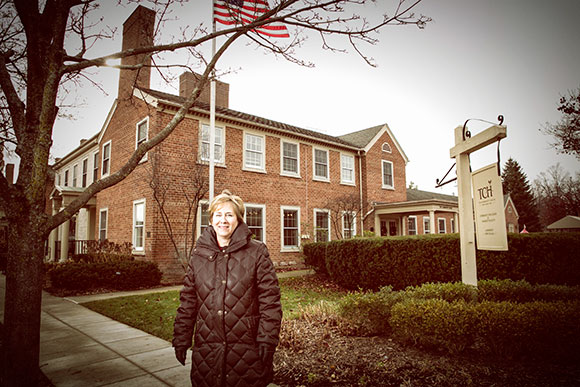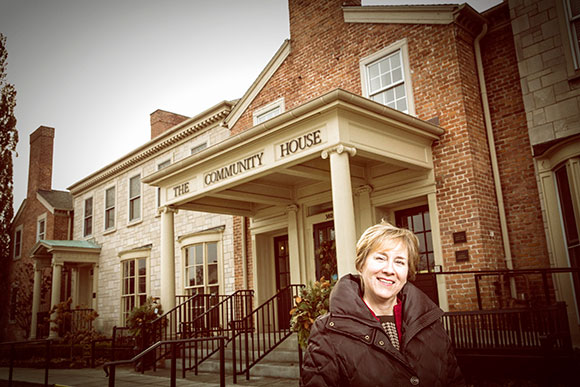Cracking the Digital Ceiling
Having more women in tech leadership positions isn't just about equity, it's about economic vitality. Metromode's Natalie Burg connects with a trio of prominent local women to get their ideas on how to unlock a new generation of female technology chiefs.
Getting your Trinity Audio player ready...
When it comes to answering the question, “What do you want to be when you grow up?” kids tend to answer based on the principle of “you have to see it to believe it.” To believe they can become something, they look to someone in that role to whom they can relate. So for all the efforts to inspire girls to enter the male-dominated technology field, one of the greatest challenges remains to be, well, the male-dominated technology field.
“Visibility is probably the biggest dilemma,” says Executive Director of the Michigan Council of Women in Technology, or MCWT, Janette Phillips. “In Metro Detroit, and everywhere, there aren’t as many women role models in technology.”
Linda Daichendt has experienced the effect of the absence of female peers firsthand. As executive director and president of the Mobile Technology Association of Michigan, she frequently gets the same question: “How in the world did you end up in charge of this organization?”
“It’s unfathomable to them that a woman is leading a state association in this industry,” she says. “Most of the time, I’m one of three or four women in the entire room.”
As a professional advocate for women in the tech industry, Phillips says the importance of female role models is key to attracting more women into the field. But where do the leaders come from without role models of their own?
It’s a digital chicken-and-egg problem, but in Metro Detroit, a number of women have been forging ahead to become the inspiration they never had for a generation of girls to see themselves in the technology field.
The Detroit Advantage
One of those women who has made it to the top of the regional tech field is Elaina Farnsworth, CEO of Mobile Comply in Pontiac. The way she sees it, the growth potential of the Detroit area makes it a prime place for women to get ahead.
“We have a lot of light on us right now,” Farnsworth says. “It’s a high visibility environment and that gives women tremendous opportunity. That’s a lot of exposure you can get here that you can’t get anywhere else.”
Not only is the area’s growth potential a boon for women in tech, but so is it’s past experience. The auto industry is becoming increasingly intertwined in technology, which makes the effort to get more women in leadership roles less novel than other industries.
“This is something women here are kind of used to dealing with,” says Daichendt. “As women have made in-roads into automotive, the same is happening with technology. As they do it, I hope they do the right thing by mentoring women who come up behind them.”
But even as opportunities for women in high tech industries grow locally, so to remain the challenges, which are deeply imbedded in both the education system and the culture of business in general.
“As a woman, you have to trust your knowledge, trust your experience, and don’t let someone second guess you,” Daichendt says. “And understand going in that you’re going to have prove yourself twice as much. It’s not fair, but it is what it is.”
She experiences what “it is” to be a woman in technology every time she has her male board chairman open the door with new companies. “I do know more in many areas than he does, and I take over once the relationship is established,” she says, “but it is a strategy we use often enough.”
As discouraging as that fact is regarding the male-dominated culture of the tech industry, why is it so important that women in get into high tech anyway? Because, whether it recognizes it or not, the industry needs them.
Tech Needs Women
Farnsworth may be among a relatively small number of area women in technology with the initials “CEO” behind her name, but she’s used to standing out.
Unlike many women who got into the industry later in their careers, Farnsworth was the only woman in her computer science graduate school program. While she never saw herself as any different than her peers, she recognizes that some of what she brings to the field as a woman is different – especially when it comes to her specialty, mobile technology.
“When the iPhone was released in 2007, I immediately realized what was going to happen,” she says. “It was a paradigm shift. And if you want to learn about a situation that is hard to discuss like bullying in a classrooms or AIDS awareness, mobile devices are very personal to people, and they can actually feel safe there.”
Breaking through the “techie talk,” as Farnswroth calls it, and connecting with people is a strength she has witnessed with women in the industry. The more pervasive technology becomes, the more important those translation skills are.
“Women do collaboration better,” says Daichendt, whose background includes marketing and management in a number of fields before she discovered her interest in technology. “We tend not to be as territorial, and we’re also more open to not everything being immediately profit driven. As women, I think we have longer-term visions.”
Because those are skills that the burgeoning high tech field tends to lack, it’s no wonder that organizations such as MCWT, Girl Develop It Detroit, Wayne State’s Go-Girl program, and Eastern Michigan University’s Digital Divas exist – because the industry needs them to.
Fixing the System
According to Daichendt, collegiate programs don’t start early enough.
“It’s not that girls are being discouraged from technology,” she says. “They’re not being educated that it’s even an option.”
Had it not been for the stereotype that girls aren’t as good at science and math, Daichendt believes she would have found her calling much earlier. Phillips continues to see them today, both through her membership at MCWT, and in her teenage daughters’ education.
“It ‘sinteresting to watch how they are not encouraged sometimes,” she says. In one instance, in fact, one of her daughters, who excels in math and science, was so blatantly intimidated by a teacher on the first day of an accelerated math class, she dropped out.
“Here I am, the director of MWCT, and this happened to my own daughter,” Phillips says. “There have to be some changes. One of our goals is to reach the teachers and counseling staff of these schools and point this out.”
Giving girls the opportunity to shine, such as girls-only FIRST Robotics teams, says Phillips, allows them to feel out their own identity in tech, without the social pressures of stereotypes and boys hanging around.
There is also, says Farnsworth, an opportunity to let girls see how technology connects to the fields they may have already imagined themselves entering.
“Don’t discount technology just because you want to be in the education field or in medicine,” she says. “Those are both highly technological fields.”
Supporting girls’ passions from a very young age and the efforts of women to support one another, says Daichendt, are also key to increasing the number of women in tech.
“It’s all about starting early and educating girls about the opportunities,” she says. “And getting buy-in from their families and the education institutions themselves. If all of that happens, I think we’re going to end up in a place where there isn’t such a disparity.”
Natalie Burg is an Ann Arbor-based freelance writer and Concentrate’s Development News Editor.













